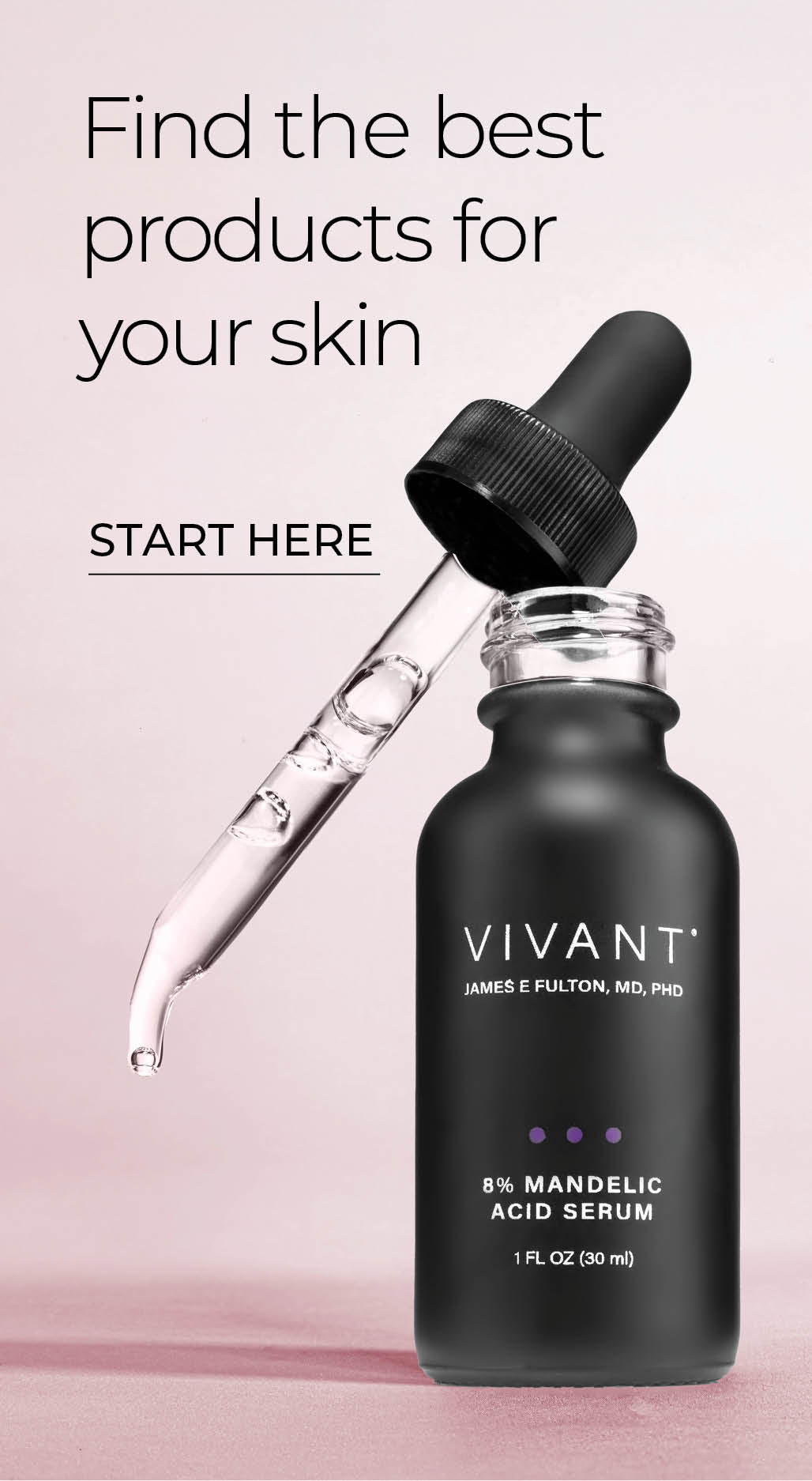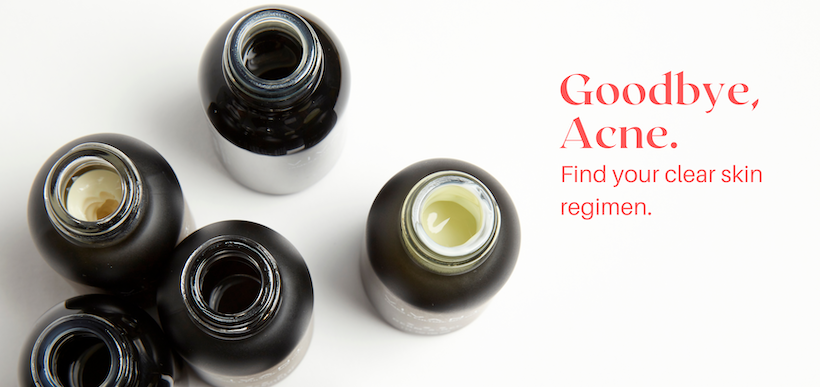Which Acid is Right for Your Skin?

Acids. The word can be frightening in the context of skin care. But it shouldn’t be. While acids are prolific exfoliators, that doesn’t make them harsh. Quite the opposite. Acids do amazing things to improve skin condition, and every skin type can benefit from them.
Table of content
Each acid has its own unique benefits. Some are lead actors and some are supporting players. Dr. Fulton took advantage of this hierarchy in his formulations, which center around two main acids—retinoic and mandelic—and used others like salicylic, kojic, ascorbic, lactic, and glycolic to complement and boost the performance of the leads.
Here is a review of the stars that deliver the most impactful and dramatic performances.
RETINOID (VITAMIN A)
While not technically an acid, retinol (vitamin A) transforms into retinoic acid in the body and works to accelerate cell turnover, stimulate collagen production, and reverse free radical damage. It’s the gold standard for treating acne and signs of aging. For acne-prone skin, it will work quickly to peel out impactions, however, because it’s not an anti-bacterial, it’s helpful to add an antibacterial to the mix like salicylic or mandelic acid.
Best Roles: Wrinkle reducer, dermis thickener, acne warrior, free radical scavenger
Best Partners: Retinoid (Vitamin A) always takes center stage but loves a large supporting cast including Kojic Acid, Glycolic Acid, Lactic Acid, Ascorbic Acid (Vitamin C)
Age Factor: A forever ingredient
MANDELIC ACID
Great for all skin types, those with dark or sensitive skin, in particular, should get familiar with mandelic acid. This alpha-hydroxy acid derived from almonds has a larger molecular structure than other AHAs, which means it’s absorbed more slowly so it won’t irritate skin or trigger hyperpigmentation. Its antimicrobial, anti-inflammatory, anti-oxidant, and melanin-inhibiting properties make it ideal for targeting the big three concerns: acne, discoloration, and signs of aging.
Best Roles: Radiance renewer, tone corrector, acne fighter
Best Partners: Mandelic is a solo artist, though it also shines with lactic acid and salicylic acid
Age Factor: A forever ingredient.
GLYCOLIC ACID
Because of its small molecular size, glycolic penetrates more quickly than other AHAs, dissolving the cellular “glue” binding dead skin cells and sloughing them away to help avoid buildup that blocks pores. In addition to accelerating cell turnover, glycolic acid stimulates collagen production and promotes a smoother texture and more consistent tone.
Best roles: Exfoliator, hydrator, collagen promoter, brightener
Best Partners: Retinyl Propionate (Vitamin A), Mandelic Acid, Kojic Acid, Glycolic Acid, Lactic Acid, Ascorbic Acid (Vitamin C)
Age Factor: A forever ingredient
SALICYLIC ACID
Salicylic is a beta hydroxy acid that is oil-soluble, which is what allows it to enter the pore where it flushes out cellular buildup, oil, and bacteria to prevent breakouts. It can be over-drying on its own, which is why it’s often tempered with other ingredients. But too much tempering can render it powerless, so the right blend is essential. Vivant's Daily Repair Pads combine salicylic with other key ingredients like Clinical Mandelic Acid, lactic acid, and niacinamide.
Best Roles: Inflammation reducer, bacteria fighter, pore cleaner
Best Partners: Retinoid (Vitamin A), Mandelic Acid, Kojic Acid, Glycolic Acid, Lactic Acid, Ascorbic Acid (Vitamin C)
Age Factor: Best for teens through forties, acneic or oily skin
ASCORBIC ACID (VITAMIN C)
This antioxidant powerhouse is essential to collagen synthesis. It’s also a natural brightener and powerful photoprotective agent. Use it as a daily UV shield to guard against wrinkles, dark spots, and fine lines, and to promote elasticity and even tone.
Best Roles: Damage control expert, preventative agent, brightener, radiance renewer
Best Partners: Works well solo, pairs well with Retinyl Propionate (Vitamin A), Kojic Acid, Glycolic Acid, Lactic Acid
Age Factor: A forever ingredient
HYALURONIC ACID
As the counterpart to collagen and the chief agent for moisture retention and elasticity, hyaluronic acid is essential to youthful looking skin. Vivant's FF3 Hydra Intensive HA is a concentrated hyaluronic acid and peptide booster serum to lift, increase moisture levels and deliver a plumped, youthful appearance.
Our recommendation:
AMINO ACID
Amino acids are building blocks of protein. They link together in small chains to form peptides, which stimulate skin's natural production of collagen, hyaluronic acid, and elastin.
Best Roles: Rejuvenator, Redness Reducer
Best partners: Retinoid (Vitamin A), Kojic Acid, Lactic Acid, Glycolic Acid
Age Factor: Good at any age, a must over 45
LACTIC ACID
Derived from milk, this gentle exfoliator has been a favorite for brightening, smoothing, and softening skin since ancient times. Lactic acid is non-irritating because its larger molecular structure keeps it mostly on the surface of the skin. It’s effective in reducing the appearance of fine lines, bringing a firming lift to sagging skin, and helping to diminish pigmentation, age spots, and acne scarring. Its humectant properties mean lactic acid draws moisture making it ideal for mature or sensitive skin.
Best Roles: Gentle exfoliator, brightener, hydrator, softener
Best Partners: Retinoid (Vitamin A), Mandelic Acid, Amino Acid, Ascorbic Acid (Vitamin C)
Age Factor: 20s and 30s for prevention, 40s and up for rejuvenation
KOJIC ACID
Mainly known for its ability to inhibit the production of tyrosinase, the enzyme responsible for melanin synthesis, kojic acid fades dark spots and prevents new pigment formation making it ideal for combatting melasma, hyperpigmentation, and age spots.
Best Roles: Brightener
Best Partners: Retinoid (Vitamin A), Lactic Acid
Age Factor: 20s and 30s for prevention, 40s and up for repair
So which acid is right for your skin? The answer may be all of them.


Comments
This is such great info, especially for a new esthetician. That’s for being a brand I look to use in the future.